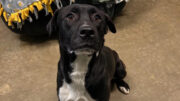Predators are personal for Shane Black. He was hacked apart by one of the fearsome alien hunters in the first “Predator” movie 31 years ago and now returns to sit in the director’s chair for the latest saga in the franchise.
Ready for some payback, Shane? More importantly, will you oversee the destruction of Predators or will you accidentally kill off the series, once and for all? The answer is a little of both.
Only a definite article in the title separates the new “The Predator ” from the 1987 debut “Predator” starring Arnold Schwarzenegger, and clearly Black is trying to capture the spirit of the testosterone-fueled original with this one led by a decorated sniper played by Boyd Holbrook. Both flicks share a welcome winking humor. If anyone asks “Everything OK back there?” you can be certain it’s not.
The first film featured cartoonishly masculine soldiers in the jungle of Central America tracking and being tracked by a huge and technologically advanced beast with dreadlocks, a face full of mandibles and the ability to both go invisible and humiliate arrogant prey. It echoed the horror of Vietnam and was a clever combination of “Rambo” and “Alien” with humor that would make a locker room blush. (Black played the bespectacled Hawkins and was an early casualty.)
Black has returned — with co-writer Fred Dekker — for another loud soldier-versus-Predator slice in an American forest — well, actually, thanks, Canada! — but with some twists. Although the filmmakers boast about a much-improved alien, the only noticeable update is the addition of their tracking canines — that’s right, “space dogs,” as one character jokes. And this time the soldiers are all suffering from PTSD, along with other problems triggered by Tourette’s syndrome, suicidal tendencies and opioid addiction. Viewers get plenty of decapitations, lynchings, head shots and bowels cut open.
Black’s filmmaking is old-school, grounded in ’80s humor, reveling at its over-the-topness and often gleefully thumbing its nose at political correctness. That might be refreshing, but it also can lead to questionable decisions. Like, is it necessary to set one of the battles — complete with assault weapons and explosions — in an elementary school?
And is it wise to portray hurting soldiers this way? They’ve nicknamed themselves “The Loonies” and they are a foul-mouthed, messy wild bunch who met in group therapy. They’re portrayed by Trevante Rhodes, Keegan-Michael Key, Thomas Jane, Alfie Allen and Augusto Aguilera, who all deliver a strange brew of toilet humor, classic misogyny and aching vulnerability, but laughing at broken men and mental illness quickly grows uncomfortable. To make matters even worse, another character has Asperger’s syndrome, which is cynically used as a plot point. Professional psychologists are not going to like this film.
One change is the addition of some estrogen in the form of Olivia Munn, who plays not just a scientist but a huge one — “I heard you basically wrote the book on evolutionary biology,” she’s told by a guy in a white lab coat. In a matter of hours, she’s gone from literally shooting herself in the foot to blasting an assault weapon with aplomb. She actually manages to make the dialogue work, as does a thrilling Sterling K. Brown, whose CIA honcho positively swaggers with flashes of pitch-dark humor. He steals the film from the ostensible hero, Holbrook, who fails to sparkle.
One welcome cameo is by Jake Busey, who plays a research scientist who studies Predators. It’s an inside joke: He’s the son of Gary Busey, who played a government scientist in “Predator 2” — so Black is keeping the part in the family. Plot-wise, to be honest, not much has changed either — a ragtag group of soldiers face off against an alien hunter. Hardcore fans will welcome the franchise’s return but neutral observers may question why this was committed to celluloid.
“What am I looking at?” Munn’s character asks about some data shown to her, but might as well be addressing the film’s audience.
“It’s exactly what you think it is,” a scientist responds.
The film created headlines after Munn flagged 20th Century Fox that a minor actor was a registered sex offender, meaning a real predator was in the mix. His scenes were soon cut, but, weirdly, she faced a backlash . If there’s ever a hero here, it’s Munn: On film, as in real life, she’s challenged the all-boys’ network.
But Black, who wrote “The Last Action Hero” and several “Lethal Weapon” films, flounders, seeing his gifts as a director tested. Scenes are poorly knitted together, especially toward the end. Time and tempo break down, as if the film were snapping apart at the seams.
Ideas are offered — might Predator DNA be mixed with those of a human? Why do Predators keep coming back to Earth? — but quickly abandoned. Some characters die in underwhelming ways, as if the film stock ran out. At the end, Black somewhat arrogantly offers a clear springboard to a sequel. Whether anyone cares for it remains to be seen.
“The Predator,” a 20th Century Fox release, is rated R by the Motion Picture Association of America for “strong bloody violence, language throughout and crude sexual references.” Running time: 108 minutes. One star out of four.




































